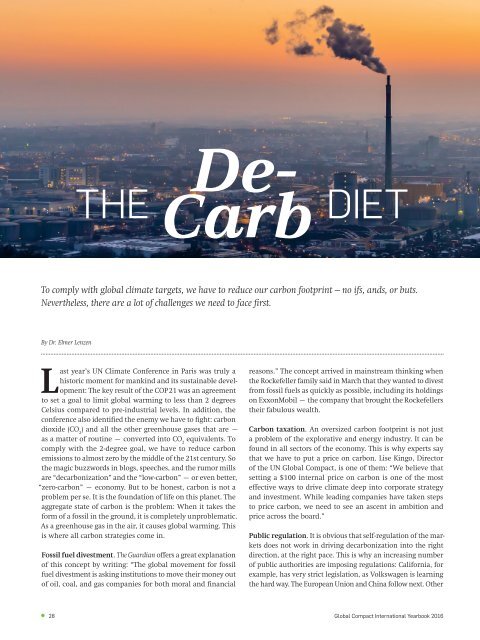Global Compact International Yearbook 2016
The Sustainable Development Goals are an ambitious agenda with 17 topics addressing the global challenges of our time. A key topic is innovation: Business must fit into planetary boundaries. This probably will not work with traditional business models. That is why we need new, fresh ideas. We need change, even when it happens in a rough, disruptive way. And the earlier the better. This is why the upcoming edition of the Global Compact International Yearbook, published in September 2016, has chosen sustainable innovation as the key topic. Also includes exclusive interviews with Angelina Jolie, Robert Redford and Sigourney Weaver. The Global Compact International Yearbook is with more than 500,000 readers one of the worlds leading CSR publications. Münster/New York 2016: 164 pages, paperback Publishing houses: macondo publishing/UN Publications Subscription (via UN Publications only): 30.00 USD (regular) 15.00 USD (reduced) ISBN13: 978-3-946284-01-7 / ISSN-Print: 2365-3396 / ISSN-Internet: 2365-340x
The Sustainable Development Goals are an ambitious agenda with 17 topics addressing the global challenges of our time. A key topic is innovation: Business must fit into planetary boundaries. This probably will not work with traditional business models. That is why we need new, fresh ideas. We need change, even when it happens in a rough, disruptive way. And the earlier the better. This is why the upcoming edition of the Global Compact International Yearbook, published in September 2016, has chosen sustainable innovation as the key topic.
Also includes exclusive interviews with Angelina Jolie, Robert Redford and Sigourney Weaver.
The Global Compact International Yearbook is with more than 500,000 readers one of the worlds leading CSR publications.
Münster/New York 2016: 164 pages, paperback
Publishing houses: macondo publishing/UN Publications
Subscription (via UN Publications only): 30.00 USD (regular) 15.00 USD (reduced)
ISBN13: 978-3-946284-01-7 / ISSN-Print: 2365-3396 / ISSN-Internet: 2365-340x
You also want an ePaper? Increase the reach of your titles
YUMPU automatically turns print PDFs into web optimized ePapers that Google loves.
The<br />
De-<br />
Carb<br />
Diet<br />
To comply with global climate targets, we have to reduce our carbon footprint – no ifs, ands, or buts.<br />
Nevertheless, there are a lot of challenges we need to face first.<br />
By Dr. Elmer Lenzen<br />
Last year’s UN Climate Conference in Paris was truly a<br />
historic moment for mankind and its sustainable development:<br />
The key result of the COP 21 was an agreement<br />
to set a goal to limit global warming to less than 2 degrees<br />
Celsius compared to pre-industrial levels. In addition, the<br />
conference also identified the enemy we have to fight: carbon<br />
dioxide (CO 2<br />
) and all the other greenhouse gases that are –<br />
as a matter of routine – converted into CO 2<br />
equivalents. To<br />
comply with the 2-degree goal, we have to reduce carbon<br />
emissions to almost zero by the middle of the 21st century. So<br />
the magic buzzwords in blogs, speeches, and the rumor mills<br />
are “decarbonization” and the “low-carbon” – or even better,<br />
“zero-carbon” – economy. But to be honest, carbon is not a<br />
problem per se. It is the foundation of life on this planet. The<br />
aggregate state of carbon is the problem: When it takes the<br />
form of a fossil in the ground, it is completely unproblematic.<br />
As a greenhouse gas in the air, it causes global warming. This<br />
is where all carbon strategies come in.<br />
Fossil fuel divestment. The Guardian offers a great explanation<br />
of this concept by writing: “The global movement for fossil<br />
fuel divestment is asking institutions to move their money out<br />
of oil, coal, and gas companies for both moral and financial<br />
reasons.” The concept arrived in mainstream thinking when<br />
the Rockefeller family said in March that they wanted to divest<br />
from fossil fuels as quickly as possible, including its holdings<br />
on ExxonMobil – the company that brought the Rockefellers<br />
their fabulous wealth.<br />
Carbon taxation. An oversized carbon footprint is not just<br />
a problem of the explorative and energy industry. It can be<br />
found in all sectors of the economy. This is why experts say<br />
that we have to put a price on carbon. Lise Kingo, Director<br />
of the UN <strong>Global</strong> <strong>Compact</strong>, is one of them: “We believe that<br />
setting a $100 internal price on carbon is one of the most<br />
effective ways to drive climate deep into corporate strategy<br />
and investment. While leading companies have taken steps<br />
to price carbon, we need to see an ascent in ambition and<br />
price across the board.”<br />
Public regulation. It is obvious that self-regulation of the markets<br />
does not work in driving decarbonization into the right<br />
direction, at the right pace. This is why an increasing number<br />
of public authorities are imposing regulations: California, for<br />
example, has very strict legislation, as Volkswagen is learning<br />
the hard way. The European Union and China follow next. Other<br />
28<br />
<strong>Global</strong> <strong>Compact</strong> <strong>International</strong> <strong>Yearbook</strong> <strong>2016</strong>

















